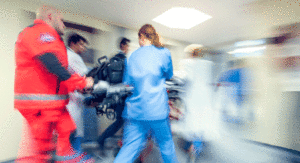 This is part of a continuing series of stories, exploring the world of paramedics and EMTs across Cape Cod, and their incalculable contribution to the region’s healthcare system. There are nearly 1,000 of these professionals who also serve as firefighters in all 15 towns. Paramedics undergo up to two years of classroom training and 400 hours of clinical work in the hospital, as well as continuous retraining coordinated by the Cape and Islands Emergency Medical Services System.
This is part of a continuing series of stories, exploring the world of paramedics and EMTs across Cape Cod, and their incalculable contribution to the region’s healthcare system. There are nearly 1,000 of these professionals who also serve as firefighters in all 15 towns. Paramedics undergo up to two years of classroom training and 400 hours of clinical work in the hospital, as well as continuous retraining coordinated by the Cape and Islands Emergency Medical Services System.
HYANNIS – Edna Wall has been an emergency room nurse for more than three decades, responding to thousands of ambulances rushing patients through the doors, many times in a life-and-death situation.
As a clinical leader, she is part of a 24-hour, seven-day-a-week world that may care for more than 300 patients daily arriving with maladies as minor as sunburn and as traumatic as a stroke.
As paramedics and EMTs wheel their patients through the automated doors at Cape Cod Hospital’s emergency department, they immediately look up at a digital screen designating which of 52 individual rooms they should head toward.
In the most acute cases, a specially equipped area is ready with doctors, nurses and life-saving equipment. If necessary, staff – already alerted by the rescue team – is at the door to take immediate action. At the same time, every one of the other rooms can accommodate any contingency.
At 10 a.m. on this day, patients have arrived suffering from shortness of breath, psychiatric issues, abdominal pain, chest congestion, hip pain, a feeding tube issue, hypertension, back pain, a nose bleed, knee pain, and an IV medication problem.
Within an hour, nearly all 52 rooms are occupied.
“As a clinical leader, we do a lot of directing of traffic, assigning nurses to cases, working not only with the doctors, but often family members and community resources if necessary,” said Wall.
A Diverse Group
She is part of a huge team that extends from fellow nurses to physicians, emergency room technicians, secretaries, diagnostic technicians and other support staff, she emphasized.
The entire emergency room at Cape Cod Healthcare depends on more than 150 diverse personnel, and that doesn’t even include those like X-ray technicians, diagnostic experts, registration staff and other specialists throughout the hospital.
There are times when an elderly patient is rushed to the emergency center by paramedics and EMTs, and there is another older and infirm spouse at home who cannot be left unsupervised. That’s when Wall will reach out to social services for assistance. Other times, they may even have to contact a town’s animal control officer because a beloved pet is left alone.
“It’s never-ending,” said Wall – not as a complaint but as an explanation for why she continues to find her work so worthwhile. “Every shift, every hour is filled with so many different cases, so many different people. It’s never knowing who is coming through those doors. “You are constantly being challenged and always growing – even after more than 30 years.”
Wall has seen it all, including the dramatic evolution in training for paramedics and their access to state-of-the-art equipment.
She cited one new technology, for example, called the Lucas 2, a mechanical cardio-pulmonary compression unit that can double or even triple a victim’s survival rate – and how it’s becoming increasingly available among the Cape’s fire and rescue departments, despite its $15,000 price tag.
“It’s saving lives way before the patient reaches us,” she said.
About 80 percent of all heart attacks occur at home, and nine out of 10 victims will die before reaching the hospital, according to the American Heart Association. With ambulance trips to Cape Cod Hospital taking sometimes 30 minutes to an hour from the lower and outer Cape, this reality is even more dramatic.
“As effective as our EMTs and paramedics are, manual CPR, especially over 30 minutes or longer, cannot replicate the consistency and stamina of a mechanical compressor,” explained John Adelizzi, EMS coordinator for the Dennis Fire Department.
Growth and Training
“It’s not only the time issue, but also the many degrees of difficulty associated with tending a patient, including the tight quarters and bumpy ride of an ambulance,” he added.
Even three decades ago, when Wall began her career in the emergency room, she marveled at the capabilities of rescue personnel. But, their growth and training over the last decade has been particularly noteworthy.
“Our paramedics and EMTs have progressed so much in the last decade,” observed Wall, who often works and mentors them as they perform hundreds of hours of on-the-job training side by side in the emergency department. “It’s incredible what they know.”
The words she and other emergency room physicians and nurses use is “empowerment” and “part of the team.” That wasn’t always the case, Wall observed. She attributes the evolution to several factors:
Local training programs coordinated by the Cape & Islands Emergency Medical Services System CIEMSS.
The advancement of new technologies in the field and in the ambulance.
Protocols developed by state medical authorities, including medical directors for Cape & Islands Emergency Services, that provide sophisticated, step-by-step guidance to paramedics on the ground.
The appointment Cape Cod Healthcare emergency room physicians as those medical directors of CIEMSS, creating a continuous liaison between all the town fire and rescue departments and the hospitals in Hyannis, Falmouth and beyond.
“Paramedics now are making cardiac diagnoses with sophisticated 12-lead EKGs and communicating directly with us, even administering medications on the spot,” she observed. “They are trained to intubate a patient to manage the airway.”
Wall emphasized the teamwork that goes into treating an emergency patient.
“The paramedics and EMTs do things we as nurses don’t, and we do things they don’t. Together, it leads to a successful outcome.”
She brings a personal perspective to all this. Her own son is a paramedic, and she watched him undergo an intense education at Anna Maria College in Paxton, where he earned two bachelor degrees in paramedic science and fire science.
Like every paramedic working on Cape Cod, he devoted years of classroom study that not only focuses on advanced medical treatment but also curriculum built around compassion and respect for patients, cultural awareness and commitment to public service.
Degrees and certification to become a paramedic include courses ranging across cardiology, Cardiology, Pathopharmacology, Trauma care, Airway, Ventilation, Oxygenation, Medical and EMS Operations.
And that’s before hundreds of hours working in the emergency department, ICU, operating rooms and many other departments of a hospital.
“He took classes that nursing students must take,” observed Wall. ‘But we don’t have to fight fires too.”























